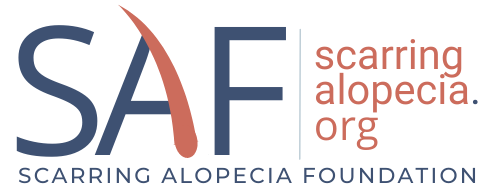A Commentary and Practical Advice about Allergens, Hair Care Products from a Fellow CCCA Patient
Commentary by Courtney Harris | CCCA Patient | Hair Stylist | SAF Board Member
As a new SAF board member, patient with CCCA, and licensed hair stylist, I volunteer with SAF not only to help my fellow scarring alopecia warriors, but to share my expertise in hair care and styling practices for the greater hair loss population. I am currently co-leading our medical editorial program, which features medical students and dermatologists summarizing one topic every week and posting to SAF’s website, social media channels, and private scarring alopecia Facebook groups.
Most recently, Jessica Brown-Korsah, a medical student at Case Western Reserve University School of Medicine, summarized an article detailing the relationship of allergen triggers to scarring alopecia conditions. To me, an alarming statistic jumped out from that summary: “Out of the 42 patients, 76% had clinically relevant allergens commonly found in cosmetics and personal care products that are applied to the scalp and face.” This motivated me to supply a bit more insight on the kinds of allergens that may trigger reactions. My personal goal is to help patients better navigate through this information and share my practical advice that can be applied to daily living.
I have learned that some of the ingredients that are listed in cosmetics, hair products, and shampoos and may cause allergic reactions range from synthetic colors, propylene glycol, DEA complexes/derivatives/condensates (Diethanolamine), MEA (Monoethanolamine), TEA (Triethanolamine), formaldehyde-releasing agents and fragrances, fragrance mix, gallates, p-phenylenediamine (PPD), MI/MCTZ, MIT, linalool, formaldehyde releaser: DMDM hydantoin, dimethoxymethane, and decamethyl-cyclopentasiloxane. Unfortunately, in my opinion, this is just the tip of the iceberg when it comes to ingredients found in cosmetics. I have read that In the European Union, there are 1,300+ allergens/toxins that are banned from being included in cosmetic ingredients.
Fortunately, I have found there are many clean/allergy-free product options out there for those suffering from allergen sensitivity and other scalp conditions. Here is my list of a few brands that are clean and have primarily natural ingredients. In addition, to celebrate women-owned businesses, I have highlighted my top four clean brands for all hair types created and owned by women.
Please be advised to always consult your dermatologist before trying any new over-the-counter products, as allergens come in the form of natural, synthetic, and chemical-based ingredients.
I list these products in no particular order. The products in bold are the ones I have used personally as a CCCA patient and professionally as a stylist in the hair salon. The products in italics are made explicitly for sufferers of hair loss. Lastly, I am not paid to suggest these products and I do not directly support any claims made by the brands. I just read the labels to fact-check ingredient contents, and these pass my personal test.
Women-Owned Clean Product Line(s)
- Qhemet Biologics – Developed by a former doctor turned products creator; has ingredients like Egyptian wheatgrass, alfalfa, barley and lavender.
- Briogeo Hair – Featuring no harsh sulfates, silicones, parabens, phthalates, DEA, or artificial dyes. Does have ingredients like rosehip algae extract and b vitamins.
- Alodia Hair Care – Products having pumpkin oil, safflower oil, red ginseng extract, lemongrass, lavender, spearmint, green tea extract, saw palmetto extract, rosemary tea tree, saw palmetto berries, green tea leaves.
- Adowa Beauty – Featuring products with oils like baobab, prickly pear seed pumpkin seed and phthalates-free fragrance.
Other Clean Hair Brands (but not necessarily owned by women only): AFM Safechoice®, Cleure®, Cln® Skin Care, Fragfre®, Harklinikken, Klorane USA, Nature Clean, Neuma Beauty, No Nothing, and Puracy®.
My honorable mentions (the brand is not clean, but they have a few clean offerings) are Kristin Ess Fragrance-Free Daily Cleansing Shampoo and Redken® Dry Shampoo/ Paste and Powder.
Please note: There are many options available on the market, but you must be careful to read the ingredients and know your allergies. Everyone has their own standards in terms of natural and synthetic ingredients, so please use resources such as the www.skinsafeproducts.com, which is a good resource to check the safety of many commercial products and find hypoallergenic, allergy-free beauty and skin care products. The Environmental Working Group’s Skin Deep database or the ThinkDirtyApp are two other resources that drill down into rating specific ingredients.
